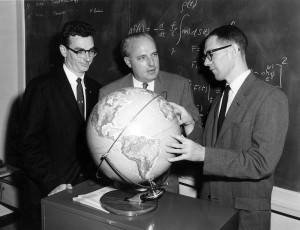Development of GPS as Example of Flexpertise?
Genesis of Satellite Navigation
I recently came across an article published in John Hopkins APL Technical Digest, Volume 19, Number 1 (1998) about the work of George Weiffenbach and William Guier. (Click Here to read the article ) In the early 1960’s they were both working at APL in the Research Center. They describe their own expertise as well as the culture in the center that encouraged then to look at different applications of their expertise.
“An environment that encouraged people to think broadly and generally about task problems and one in which inquisitive kids felt free to follow their curiosity.” Equally important, it was an environment wherein kids with an initial success could turn to colleagues who were broadly expert in relevant tasks, because of the genius of the Laboratory Directorship, colleagues who were also knowledgeable about hardware, weapons and weapons needs. Finally we agree that it probably couldn’t have happened without Frank McClure and Dick Kershner. They were unique.”
It seems to me that this might be an example of application of Flexpertise both at the organizational and individual level. For example:
- Asking probing questions from a position of curiosity that encourage exploration beyond what is known today.
- Bringing people together to work on complex problems who have some overlap in their expertise.
- Providing a general direction, then independence to explore the problem and determine possible solutions.
- Paying attention to external events, seeing potential connections, actively searching for implications for the organization or ways to extend the idea to create something new or new ways of understanding.
- Having interests related to but outside of domain of expertise.
- Running small experiments and integrating lessons learned into next experiment.
What are your thoughts after reading the article?


T J Elliott
Really interesting, similar to other situations (reading Bruce Strong & JC Spender’s book on Strategic Conversation and their conditions) , and probaly applicable to what we are exploring.
Thanks!
Two other unrelated points: can this blog be on an RSS feed so we would know something was posted?
The scroll bar appears not to work at elast in my IE browser.
Sue Borchardt
Hi Marga — I don’t see the article but recently listened to a TED radiohour podcast that mentioned this group’s work on developing GPS. Back in my engineering days I was a co-op student at APL and, after graduation, was accepted into their Associate Staff Training Program — my first job out of college. In hindsight, I wonder if the ASTP was intended to lay the groundwork for the interdisciplinary culture that pervaded APL. In a nutshell, each year a cohort of 25-30 new math and engineering graduates were hired into the ASTP, but without a particular department or position. We spent a few months taking courses, getting to know each other, getting to know the lab, working on engineering problems, and “interviewing” with various lab departments. For me, the program fostered lasting personal, cross-departmental, relationships — people who I could call on when I needed some fresh thinking on a problem. At some point after my departure in 1992-ish, I had heard that they phased out the ASTP program — I imagine it was expensive to run. I’m curious if the culture there has changed as a result, and if so, how.